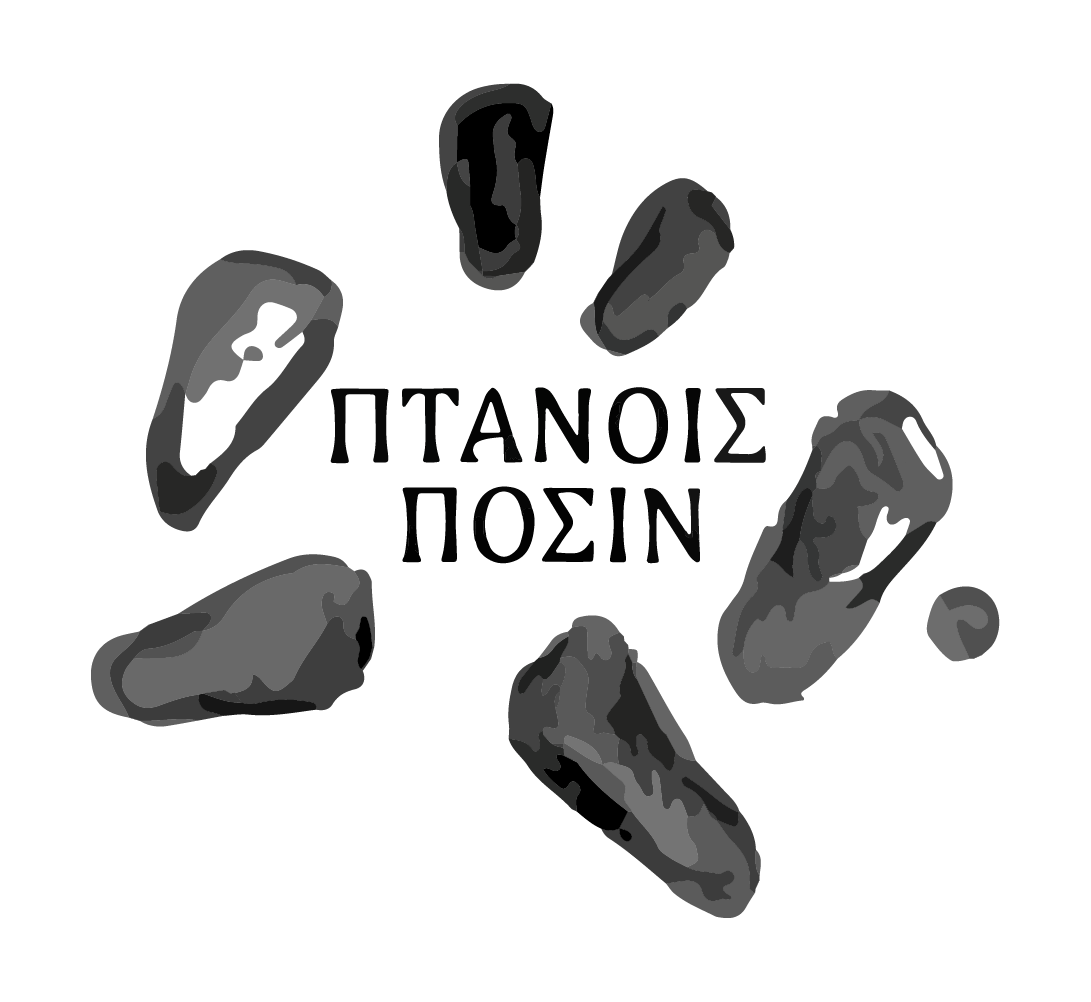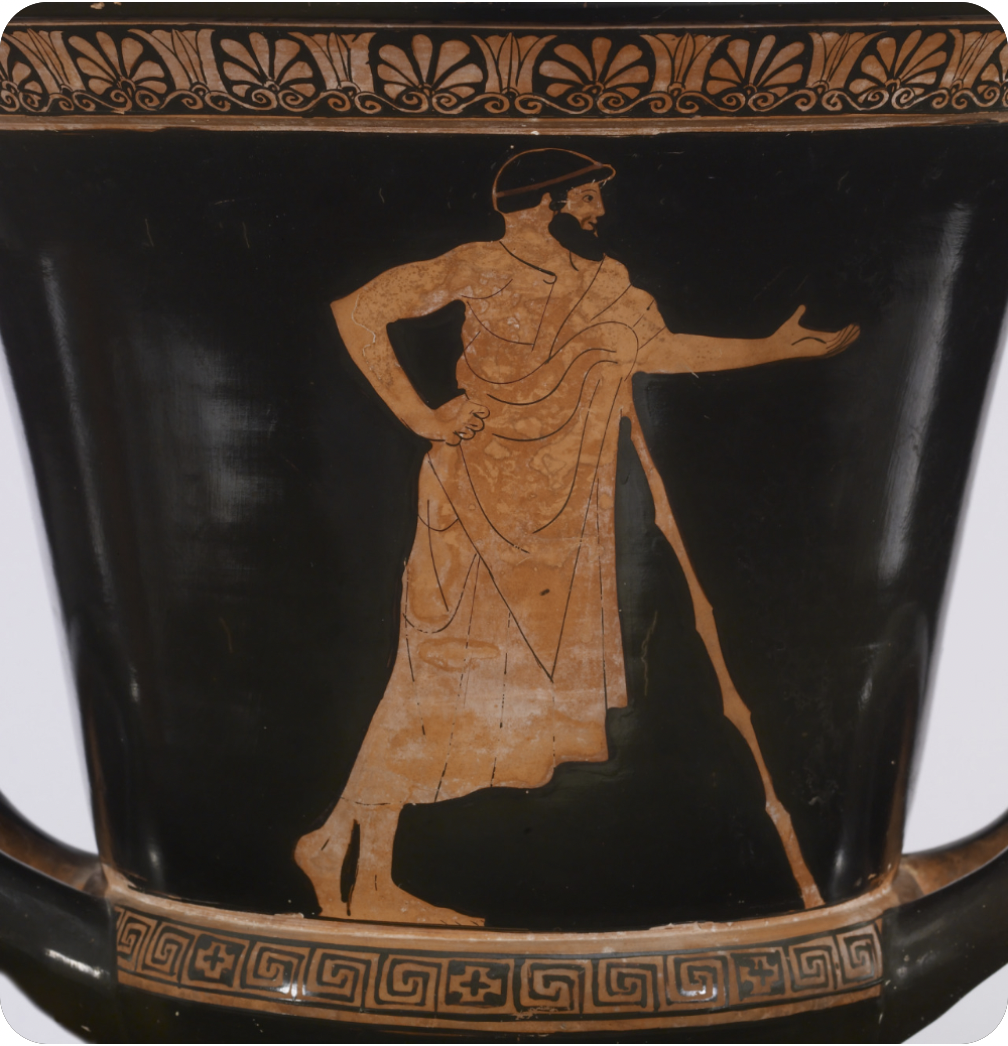FD III 3, 145
Aristodama of Smyrna, the daughter of Amyntas: epic poetess
Date:
last quarter 3rd century BC
Edition:
[ἀγαθᾶ]ι τύχαι. [ἐπὶ ἄρχοντ]ος Στρατονίκου
[ἔδοξε] τᾶι πόλει τῶν [Χαλειῶ]ν· ἐπειδὴ
[Ἀριστοδ]άμ[α Ἀμ]ύντα Ζμυρναί[α] ἀπ’ Ἰωνίας
[ἐπέωμ] ποιήτρι[α] πα̣ρα̣[γε]ν̣ο̣μ̣[έ]να ΠΛΕΙ
5 [․5-6․․]Π․․․․․ΑΙ․Ι․․․․․ΤΟΙ․․Ι.Ν
[․․․․10․․․․]Ν․․ΑΙ․․Ρ․Ε․ΥΕΤΟ․․․․ΟΥΣ
[․․․․10․․․․]ΝΟ․․․․․Τ․․ΛΙ․․․․․․․ΓΑΣ
[․․․․10․․․․]ΙΦ․․․․․․․․Ι․ΙΟΙ․Τ․․․․․․․
[․․․․․12․․․․․]Α ․․ καὶ τῶν προγόνων τῶν τᾶ[ς]
10 [πόλιος ἁμῶν] μν[άμ]αν ἐποιήσατο· ὅπως οὖν
[φαινώμεθα τι]μέοντες αὐτὰν κατὰ τὸ ποθῖκον,
[ἐπαινέσαι αὐτὰν] ἐπί τε τᾶι εὐσεβείαι ἇι ἔχει ποτὶ
[τὸν θεὸν κα]ὶ τᾶς ποτὶ τὰν πόλιν εὐνοίας
[ἕνεκα καὶ στ]εφανῶσαι αὐτὰν δάφνας [ἱε]ρᾶ[ς]
15 [στεφάνωι τᾶ]ς παρὰ τοῦ θεοῦ καθὼς πάτριόν [ἐσ]τι
[Χαλειέοις· τὰ]ν δὲ ἀναγγελίαν ποιήσασθαι
[τὸν ἱεροκάρυκα] ἐν τ[ᾶ]ι παναγύρει τῶν Ποιτρο-
[πίων· πέμπε]σθαι δὲ αὐτᾶι καὶ ἀπὸ τᾶς
[πόλιος ἁμῶν γέρ]ας πα[ρ]ὰ τοῦ Ἀπόλλων[ο]ς
20 ἐκ τᾶς θυσίας μ̣ερί[δ]α [κρεῶν ἐπὶ τὰν ἑστίαν ἐν]
Ζμύρναν· εἶμεν δὲ αὐτὰν [πρόξενον καὶ εὐεργέτιν]
τᾶς πόλιος· δεδόσθαι δὲ αὐ[τᾶι παρὰ τᾶς πόλιος]
καὶ τοῖς ἐγγόνοις αὐτᾶς [κ]αὶ γ[ᾶς καὶ οἰκίας]
ἔγκτησιν καὶ ἀτέλειαν κα[ὶ ἀσυλίαν καὶ ἀσφάλειαν]
25 καὶ πολέμου καὶ εἰράνας κατὰ [γᾶν καὶ κατὰ]
θάλασσαν καὶ τἆλλα πάντ[α ὅσα καὶ τοῖς]
ἄλλοις προξένοις καὶ εὐεργ[έταις τᾶς πόλιος ὑπάρχει]·
ἀποστεῖλαι δὲ αὐτᾶι καὶ ξένια [ἀπὸ δραχμ]ᾶν
ἐκατόν· ὑπαρχέτω δὲ καὶ Διον[υσίωι τῶι] vacat
30 ἀδελφεῶι αὐτᾶς προξενία, πο[λιτεία, ἀ]τέλεια·
ὅπως δὲ καὶ πάντοις φανερὸν ἦι [τοῖς ἀφικνε]ιμένοις
ποτὶ τὸ ἱερὸν ὅτι ἁ πόλις τῶν Χαλ[ειέων π]ερὶ πολλοῦ
ποιεῖται τὸ τιμῆν τοὺς λέγειν ἢ γρά[φειν] περὶ τοῦ θεοῦ
προαιρειμένους, τὸ ψάφισμα τόδε [ἀναγρ]άψαι τὸν
35 ἐπιδα[μι]οργὸν Ἀρχα<γ>όραν μετὰ το[ῦ γραμ]ματέος
[Φ]ιλίου {Γ} [καὶ] ἀναθέμεν τὸ μὲν πα[ρὰ τὸν] ναὸν
τοῦ Ἀπό[λλ]ωνος τοῦ Νασιώτα, τὸ [δὲ ἐν Δ]ελφοῖς.
Translations (en):
“To good fortune. Under the archonship of Stratonikos, it was resolved by the city of Chaleion: since Aristodama of Smyrna, the daughter of Amyntas, epic poetess, who came … and remembered the ancestors of our city; in order to honor her as befits, may she be praised for the piety she shows towards the god and the benevolence towards the city and let her be crowned with the sacred laurel of the god, as custom in Chaleion; the sacred herald shall proclaim it at the feast of the Poitropia; may she receive by our city, as γέρας on account of Apollo, a piece of sacrificial meat for the common altar in Smirne; may she be proxenos and benefactor of our city; may she and her descendants have the right to possess lands and home, exemption from all taxes and immunity for herself and her possessions, at war and peace, in land and sea, and all the other privileges that belong to the other proxenoi and benefactors of the city; may she receive xenia for the amount of one hundred dracmai; may her brother Dionysios have the proxeny as well, the right of citizenship, exemption from taxes; so that it shall be clear to all who come to the sanctuary that the city of Chaleion pays great tribute to those who choose to speak and write about the god; the epidemiurgos Archagoras together with the secretary Philios shall have this decree inscribed and shall place one copy of it in the sanctuary of Apollo Nesiotes, the other one in Delphi.”
Translations (it):
“Alla buona fortuna. Sotto l’arcontato di Stratonikos, sembrò bene alla città di Chaleion: poiché Aristodama di Smirne dalla Ionia, figlia di Amyntas, poetessa epica, essendo giunta … e ricordò gli antenati della nostra città; affinché dunque mostriamo di onorarla come conviene, la si lodi per la pietas che serba verso il dio e per la benevolenza verso la città e la si incoroni con una corona d’alloro sacro quello presso il dio come è patrio costume presso Chaleion; l’araldo sacro faccia la proclamazione alla festa dei Poitropia; le si invii anche dalla nostra città, come γέρας per conto di Apollo, un pezzo delle carni dal sacrificio per l’altare comune a Smirne; sia ella prosseno ed evergete della città; sia concesso a lei e ai suoi discendenti da parte della città il diritto di possedere terra e casa, l’esenzione dalle tasse e l’immunità per la propria persona e per i propri beni, in guerra e in pace, per terra e per mare e tutti gli altri benefici quanti appartengono anche agli altri prosseni ed evergeti della città; le si inviino anche doni ospitali per cento dracme; siano riconosciuti anche a suo fratello Dionysios la prossenia, il diritto di
cittadinanza, l’esenzione dalle imposte. Affinché sia chiaro anche a tutti coloro che giungono al santuario che la città di Chaleion rende omaggio grandemente a coloro che scelgono di parlare o scrivere intorno al dio, l’epidemiurgo Archagoras insieme con il segretario Philios faccia incidere questo decreto e ne ponga uno presso il santuario di Apollo Nesiotes, l’altro a Delfi.”
Commentary (en):
This decree, together with another document from Lamia (Syll3 532), offers valuable information on the performances and poetic skills of the poetess Aristodama. In the decree from Lamia we acknowledge that this she composed literary works praising the Aetolians and their ethnos. Therefore, the topic concerned local history and the genre was the poetic encomium. Both the city of Delphi and Lamia granted the same generous privileges to Aristodama’s brother Dionysios, who chaperoned her.
Commentary (it):
Questo decreto, insieme a un altro da Lamia (Syll3 532), offre notizia sulle competenze poetiche di Aristodama, professionista giunta da Smirne, e sull’attività letteraria e insieme propagandistica condotta in favore degli Etoli. Il docmento di Lamia ci informa infatti che i componimenti di Aristodama concernevano la stirpe degli Etoli. L’argomento dunque era quello storico-regionale nella forma dell’encomio in versi. Sia la città di Delfi che Lamia accordarono, con particolare munificenza, i medesimi benefici anche al fratello Dionysios, che evidentemente accompagnava Aristodama nel viaggio. Il caso di questa poetessa da Smirne è anche notevole per l’attestazione della concessione della cittadinanza a una donna.

